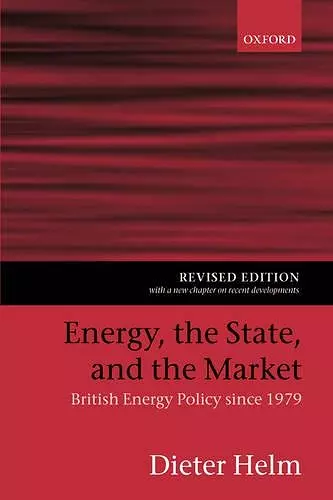Energy, the State, and the Market
British Energy Policy since 1979
Format:Hardback
Publisher:Oxford University Press
Published:13th Feb '03
Currently unavailable, and unfortunately no date known when it will be back
This hardback is available in another edition too:
- Paperback£51.00(9780199270743)

The transformation of Britain's energy policy in the last two decades has been more radical than any such change in developed economies. Since 1979 the great state energy monopolies created after the Second World War have been privatised and made subject to competition. Images of Arthur Scargill and the miners' strike of the 1980s remain vivid, but what effect has the new market philosophy had on Britain's energy industries? Since 1979 the National Coal Board, British Gas and the Central Electricity Generating Board have all been broken up. Energy trading, electricity pools, auctions and futures markets first developed, but they failed to solve the old energy policy problems of security of supply and network integrity, and the new ones of the environment and reliance on gas. The government introduced a new regulatory regime as a temporary necessity but regulation did not wither away, rather it grew to be more pervasive. Changing the ownership of the industries did not reduce the government's involvement, it simply changed its form. The 1980s and 1990s were years of energy surpluses and low fossil-fuel prices. There was little need to invest, and much of the investment in the so-called dash for gas was artificially stimulated. The new owners sweated the assets, and engaged in major financial engineering. Takeovers consolidated the industry into a smaller number of dominant firms. As investment priorities became more urgent, with the environmental pressures of climate change and the gradual switch to imported gas, the market philosophy was found wanting. Energy policy could not rely solely on the market. And it is the government which finds itself responsible for resolving the core issues of energy policy. Helm's book tells this story. It is a major study of the new market approach to energy policy in Britain since 1979. It describes the miners' strike, the privatisations of the gas, electricity, nuclear generation, and coal industries, and looks at events such as the dash for gas, regulatory failures in setting monopoly prices, and the takeovers and the consolidations of the late 1990s. Helm sets out the achievements of the new market philosophy, but also analyses why it has ultimately failed to turn energy industries into normal commodity businesses.
A worthwhile read if you want a knowledgeable and objective view of the dramatic developments in the UK's energy sector over the past two decades. * Electrical Review *
Strong on economic and political analysis, Helm concedes that the country's regulatory and corporate life is strongly influenced by individuals, perhaps more so in the UK than in other nations. His knowledge and insights into their motivations and manoeuvrings are enlightening. * Electrical Review *
... a readable explanation of events since 1979. * Electrical Review *
... will be a valuable work of reference to anyone the least bit interested in the UK energy scene ... The final chapter is a masterly review of where we are now and possible future developments ... the commentary is unfailingly stimulating and full of insight. This book can be thoroughly recommended for any student of the energy industry both for its intrinsic historical interest, but more particularly for the light it sheds on contemporary and future problems in the industry. * The Journal of Energy Literature *
Helm brings to his work a sense of authority that is absent from most contemporary debate about energy policy. His approach to his subject is at once lively, polemical, and just. He also writes vividly and fluently, in a style that can be as sharp and didactic as Orwell's ... There will not be a more important contribution to the energy policy and energy regulation debate for a long time. * Roger Barnard, regulatory lawyer at London Electricity Group, Utility Week *
Should be compulsory reading for all those who sense that the new problems of the environment and gas import dependency may mean that a watershed in that process and its methods of regulation is imminent ... comprehensive ... very robustly sourced. * Roger Barnard, regulatory lawyer at London Electricity Group, Utility Week *
Helm's caustic analysis finds contradictions at the heart of Britain's energy policy under the present and previous governments. * David Buchan, FT *
ISBN: 9780199262038
Dimensions: 242mm x 162mm x 31mm
Weight: 813g
476 pages